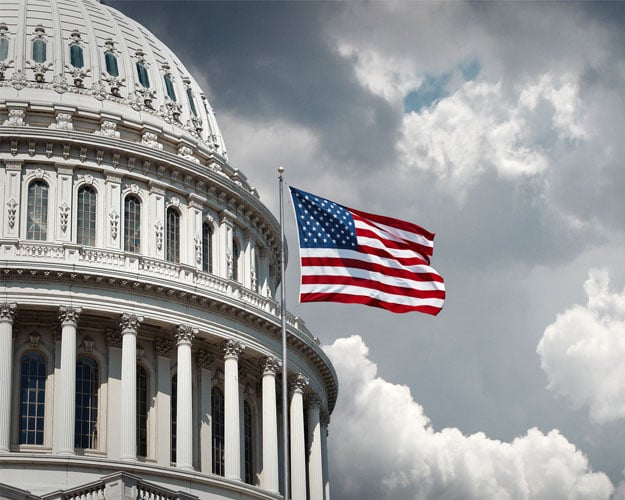Key Takeaways
- Brief Overview of the One Big Beautiful Bill
- Mid-Year Cases & Trends
- OK Decides that Native Americans owe income tax
Welcome to this edition of our roundup of state tax developments. The State Tax News and Views is published biweekly. Consider the Eide Bailly State & Local Tax team for your state tax planning, compliance, and incentive needs.
The Good, the Bad, and the Ugly in the One Big Beautiful Bill Act - Daniel Bunn, Alex Muresianu, William McBride, Tax Foundation:
While the One Big Beautiful Bill (OBBB) is a federal law, we would be remiss not to mention it in the State Tax News and Views Blog. One of the marquee issues addressed in the bill is the state and local tax deduction cap (SALT cap). The bill raises the cap from $10,000 to $40,000 for taxpayers making less than $500,000. But this change is only in place through 2029, when the SALT cap reverts back to $10,000. The so-called SALT cap workarounds that most states have enacted would remain unchanged, except that at least one state (Oregon) has a workaround that is scheduled to expire at the end of 2025 and the legislature adjourned without extending it.
...
Maryland's tech tax explicitly targets the kinds of foundation on which companies rely to operate in the modern economy—services such as data hosting and software development. They aren’t luxuries or nice-to-haves that can be taxed as a proxy for progressivity; they’re necessities. Taxing them invites distortion.
Related: Maryland Budget Passes with New Tax on Technology Services, Surtax on Capital Gains
Top State & Local Tax Policies of 2025: Midyear Report - Michael Nunes, Law360 ($):
Some states have sought to change their tax regimes this year to target high-income earners in a bid to increase revenue. But others have done the opposite, opting to continue tax cuts even through federal funding for social programs may be constrained by the proposed federal budget.
Here, Law360 looks at some of the top trends in state and local tax policy so far in 2025.
State & Local Tax Cases To Watch In The 2nd Half Of 2025 - Maria Koklanaris, Law360 ($):
State-By-State Roundup
California
California CEO Held Personally Liable for LLC's Unpaid Taxes - Christopher Jardine, Tax Notes ($):
In Matter of Hargrave, the OTA determined that C. Hargrave willfully failed to pay TBS Inglewood LLC's liabilities and is liable for $64,940 in unpaid taxes.
California Budget Plan With Tax Changes Goes to Governor Newsom - Laura Mahoney, Bloomberg Tax ($):
...
- The tax bill (S.B. 132) would extend the pass-through entity elective tax to allow some business entities to get around the federal limit on deductions for state and local tax payments from 2026 through 2031 if Congress extends the cap.
- It also would boost funding for the film and television tax credit to $750 million a year, as Newsom requested.
- It would switch from requiring financial institutions to compare property, payroll, and sales in California to those factors elsewhere when calculating California income tax to mandating a single-sales factor formula.
Colorado
Netflix Loses Colorado Sales Tax Appeal - Christopher Jardine, Tax Notes ($):
Netflix claimed that tangible personal property includes only physical objects that can be seen and touched, while the DOR argued that it includes items that are perceptible to the senses and have a "physical presence capable of transfer."
The appeals court agreed with the DOR, finding that because tangible personal property means corporeal personal property under the statute and "corporeal" refers to things that "can be perceived by any of the senses - not exclusively the sense of touch," Netflix's subscriptions are corporeal personal property.
Kansas
Kansas Implements Long-Term Sales Tax Exemption for Data Centers Under Senate Bill 98 - Colette Sutton, Eide Bailly LLP:
The exemption covers purchases of tangible personal property and services used in constructing, expanding, or remodeling qualified data centers, including data center equipment and labor for installation, repair, or maintenance. Contractors may also utilize the exemption for related work, provided they supply the required documentation and comply with audit procedures. The exemption can last up to 20 years from the commencement of operations, as long as the firm continues to meet the statutory investment and employment requirements. Overall, Notice 25-03 reflects Kansas’s efforts under Senate Bill 98 to promote long-term economic development by attracting high-impact data infrastructure projects.
Please reach out to Eide Bailly State & Local Tax Credits and Incentives team for planning opportunities.
Louisiana
Louisiana Updates Sales and Use Tax Provisions - Melissa Menter, Eide Bailly LLP:
The Louisiana Governor enacted SB 162, an act affecting the administration of sales and use taxes. The law simplifies the definition of a "dealer" to include "any person who is engaged in business in Louisiana through participation in the retail sales market within the state through any means whatsoever or who otherwise avails himself of the substantial privilege of carrying on business within the state, including through virtual or economic contacts." This definition is in addition to the definition defined in R.S. 47:301(4) and also includes "every person who manufactures or produces tangible personal property or digital products for sale at retail, for use or consumption, or distribution, or for storage to be used or consumed in a taxing jurisdicition." Under existing Louisiana law, dealers must apply for a sales tax certificate and have an obligation to collect and remit sales tax.
The law also changes "products transferred electronically" to "digital products", and clarifies that once a marketplace facilitator's sales exceed $100,000 in a calendar year, that facilitator will be a dealer for all subsequent sales.
Ohio
Ohio Will Move To Flat Income Tax Rate - Jacqueline McCool, Law360 ($):
Under H.B. 96, which DeWine, a Republican, signed Monday, Ohio's top income tax rate of 3.5% will drop to 3.125% for tax year 2025 and be eliminated in tax year 2026. The current lower income tax rate of 2.75% will be imposed on incomes over $26,050 starting in 2026, according to a summary of the legislation.
Oklahoma
Oklahoma Ruling on Tribal Citizen Taxation Muddies Precedent - Perry Cooper, Bloomberg Tax ($):
...
The US Supreme Court could “bring a lot of clarity by reaffirming that where land has been set aside by Congress as a reservation, and Congress hasn’t disestablished the reservation, then it remains a reservation for all purposes,” Kanji said. That would have a broad application across a variety of civil and criminal fronts and “nip a lot of this nonsense in the bud,” he said.
Pennsylvania
Pennsylvania HB 1694 Establishes New Tax Amnesty Program for Delinquent Taxpayers - Colette Sutton, Eide Bailly LLP:
Pennsylvania House Bill 1694 (HB 1694), introduced on July 7, 2025, proposes the establishment of a tax amnesty program for Fiscal Year 2025–2026. The bill seeks to amend the Tax Reform Code of 1971 to allow delinquent taxpayers an opportunity to resolve outstanding state tax liabilities with potential relief from penalties or interest. Although specific details of the program—such as eligibility criteria, applicable tax types, and the duration of the amnesty window—have not yet been publicly disclosed, the general purpose is to encourage voluntary compliance and boost state revenue without resorting to aggressive enforcement actions.
HB 1694 has been referred to the House Finance Committee for review, where it awaits further discussion and potential amendments before moving forward in the legislative process. If enacted, the amnesty program could benefit both the Commonwealth, by recovering unpaid taxes, and taxpayers, by reducing the financial burden of past-due obligations.
Washington Schedules Listening Sessions to Receive Feedback on New Business Activities Added to the Definition of Retail Sales - Melissa Menter, Eide Bailly LLP:
The Washington Department of Revenue is hosting a series of online listening sessions beginning July 22 to hear from interested parties about significant changes to Washington's sales tax law under ESSB 5814. Beginning October 1, 2025, many services will be subject to retail sales tax including information technology services, custom website development services, temporary staffing services, advertising services and sales of custom software and customization of prewritten software. Separate listening sessions are scheduled for each type of newly taxable service and attendees must register to attend.
Related: Washington State Expands Sales Tax to Tech and Digital ServicesWisconsin
Wis. Children's Hospital Denied Exemption For Hospital Tower - Michael Nunes, Law360 ($):
. . .
In its decision, the court ruled that state statute exempts eligible property only if it were being used as a nonprofit hospital.

Tax Bites: Tips, Tricks and Opportunities in SALT
Andrew Michuda, Manager, Eide Bailly:
Many businesses may assume that 100% of their taxable income is subject to their home state’s tax if they have no employees or property located outside the state. But this may not always be the case. If you are making sales to out of state customers, some states may allow you to apportion income, even if your connection to other states is limited.
Make a habit of sustained success.




